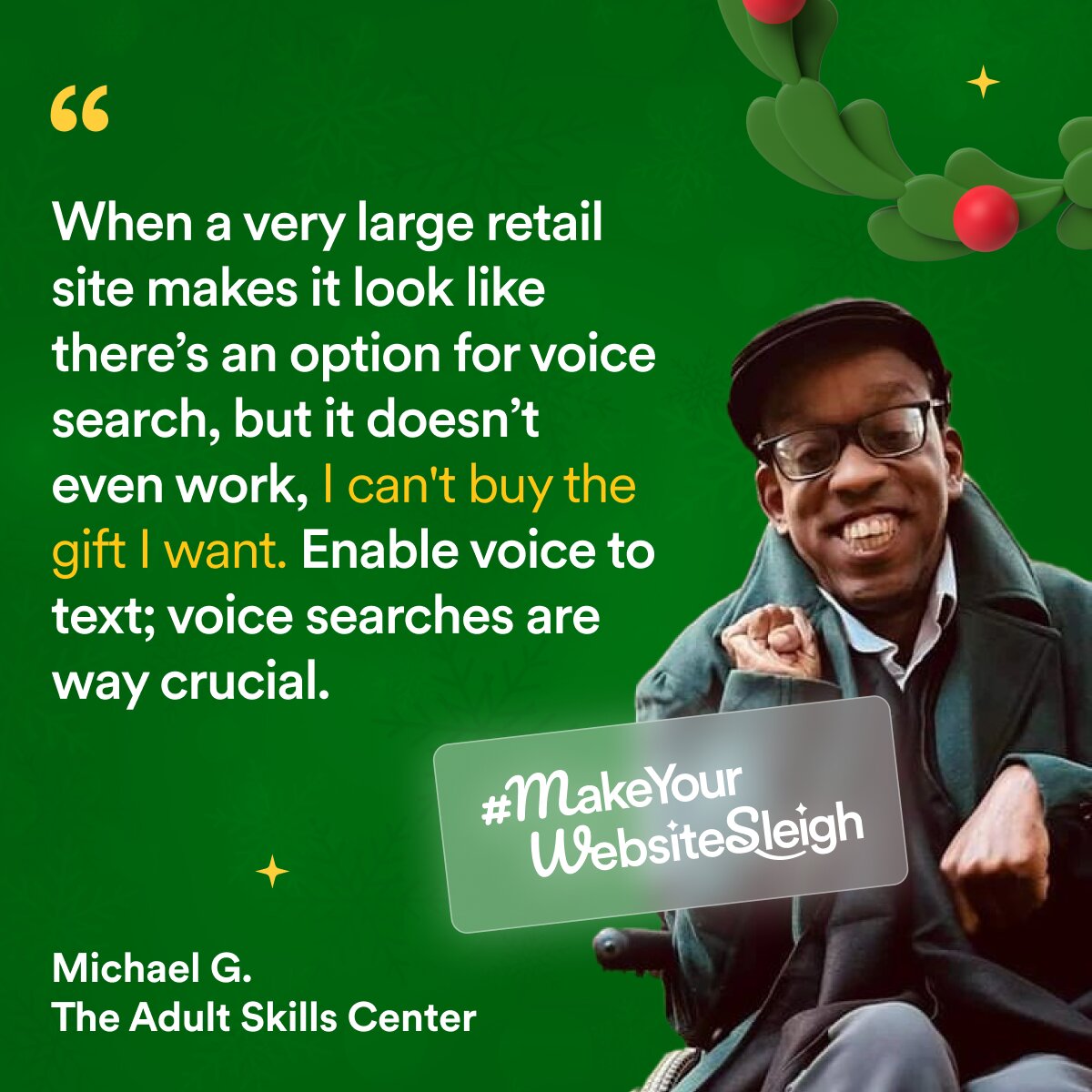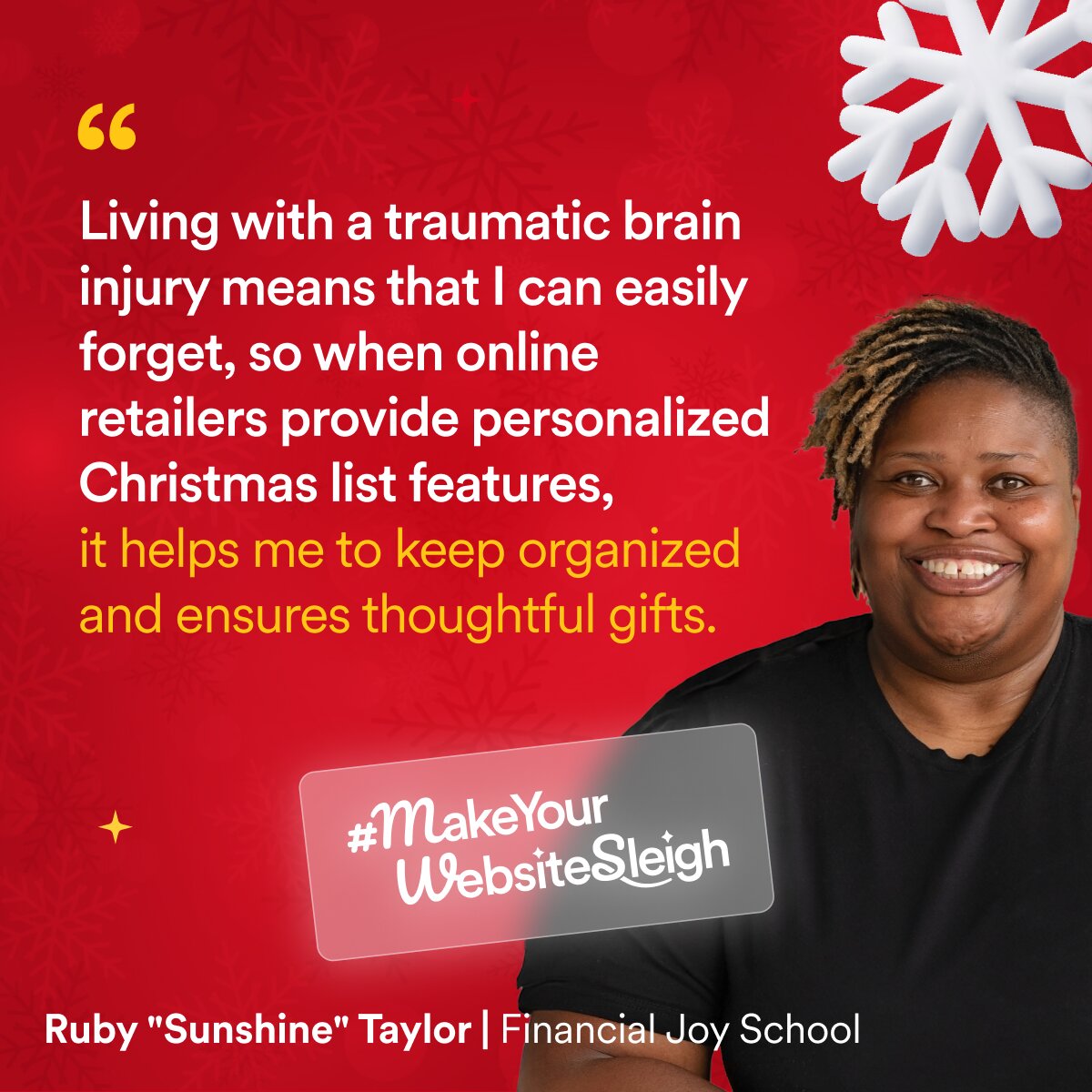The holidays are all about giving. That’s why we set out on a meaningful mission to share some important research with eCommerce businesses about online gift shopping among consumers with disabilities. In collaboration with Open Inclusion, we discovered the cost of inaccessibility and the spending power of the disability communities.
A few of the insights we found are:
- People with disabilities in the U.S. will spend an estimated $22 billion in online gift shopping for Christmas.
- Web accessibility difficulties can cost businesses $8 billion in holiday revenue.
- 32% of people with disabilities would buy additional items if the online purchasing process were easier.
To spread awareness for web accessibility and bring these stats to eCommerce businesses everywhere an amazing group of influencers with disabilities shared more about their online shopping experiences. Hopefully, now more eCommerce businesses understand that consumers with disabilities are an important demographic in gift shopping this holiday season, and it’s up to them to make it happen.
The gift that keeps on influencing
Let’s meet some fantastic influencers who took part in accessiBe’s holiday mission to bring web accessibility to the top of the eCommerce priority list.
Say hi to Michael G
“When a very large retail site makes it look like there’s an option for voice search, but it doesn’t even work, I can’t buy the gift I want. Enable voice to text; voice searches are way crucial."

Take Michael’s word for it! Voice searches are an absolute necessity to get gift shopping right. With voice searches, people with mobility disabilities will have a more accessible experience and they can hunt for the deals they’ll want to spend their money on.
Meet Ruby “Sunshine” Taylor
“Living with a traumatic brain injury means that I can easily forget, so when online retailers provide personalized Christmas list features, it helps me to keep organized and ensures thoughtful gifts.”

Ruby shared a great accessibility tip with eCommerce businesses so they can make their #websitesleigh this holiday season. Knowing your audience is key, and helping them shop based on their preferences or interests always motivates an added purchase or two.
Introducing Jazzy Whips
“All I want for Christmas is for all the gift ads to include captions, so everyone can have access to buying cute gifts for their favorite people.”

Many websites out there are still not accessible to people with hearing disabilities or consumers who are deaf. Captions mitigate the frustration of shopping without sound, and your ads will be more inclusive and engaging for all.
This is Molly Brooks Dridge
“How do I break it to my sister that I bought a new pair of trainers instead of her Christmas gift thanks to my ADHD and the very persistent pop-up ads distracting me.”

Everyone wants to buy the products they think their friends and families will love without experiencing a million barriers digitally. Over the busy holiday period, this process should be fun, quick, and easy. If you can accomplish that, you’re minimizing the risk of abandoned baskets and a resulting loss in sales.
A giveaway to remember
One of our strongest collaborations accessiBe secured on a holiday mission was with Shane Burcaw. We were honored and appreciative to team up with Shane and host a giveaway contest for our many followers who support web accessibility and want to advocate for inclusion.
On Instagram, Shane announced the giveaway and its prizes, which include an iPhone 14 and AirPods. Our followers needed to answer one critical question to enter the giveaway contest: “What makes a website sleigh?”

The giveaway had over 500 entries and we couldn’t have been more excited to see web accessibility and inclusion fans getting into the holiday spirit.
Make it sleigh year-round
Our holiday mission was to inform eCommerce businesses of the benefits they could be missing out on if they didn’t open their website’s doors to everyone. With research that shows digital accessibility is a rewarding practice in both brand reputation and revenue, businesses can rest assured that they’re making a strategic decision that also helps everyone, regardless of ability, take part in online shopping festivities.
As we reflect on the efforts of this holiday mission, we can see that when businesses prioritize accessibility, they not only enhance their website’s user experience but also contribute to a more inclusive internet that should remain just as accessible even after the holiday season has ended.
